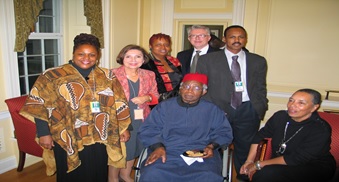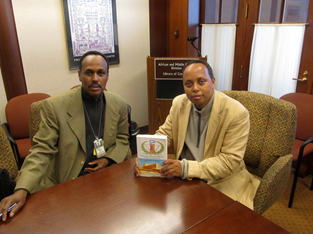Editor’s Note: Libraries serve as community cultural centers, preserve historic artifacts, oral histories, and a place where students and individuals gather to study, research and explore. Despite the increased traction in the digital age and the perceived obsolescence, libraries still remain and play a key role as learning and cultural centers. Thus, WardheerNews.com is pleased to bring to its readers an interview with Abdulahi Ahmed (Somaliyow), a librarian at the Library of Congress, the world’s largest library. Abdelkarim Hassan conducted the interview for WardheerNews.com.
——————————–
WardheerNews (WDN): Abdulahi, we are delighted to welcome you to WardheerNews; before we delve into the interview, could you please share with us a brief background about yourself?

Mr. Abdulahi Ahmed: I was born and raised in Jamaame, Somalia where I attended my primary education at Jubba Mennonite Mission School. Jamaame is a small agricultural town on the banks of the Jubba River. It was a place where everybody knew each other and you never locked your doors. I have also lived in Kismaayo and played professional soccer for the Port of Kismayo team (DEKEDDA). After a brief stint of working in Saudi Arabia, I decided to pursue a more rewarding career, so I immigrated to The United States of America and obtained a Master’s degree in International Commerce and Policy from George Mason University. In conjunction with my studies, I did a year of study abroad at the Institute of Economics of Beijing China, Institute of International Economics in Geneva, Switzerland and Oxford University England.
I joined the Library of Congress in 2003. I authored two books, about Somali culture, History of Somali Plays and Arts with Mohamed Sh. Hassan in 2011 and Somali Folk Dances in 2014.
WDN: The Library of Congress prides itself as the largest library in the world with more than 158 million matreial conssiting of books and other pusblihed works; what can you tell us about the history of the library?
Abdulahi: The Library of Congress officially serves the United States Congress, but it is also the de facto national library of the United States. It is the oldest federal cultural institution in the United States. By 1990, the Library of Congress became the world’s largest library, and retains that title today. The Library’s collections are universal, not limited by subject, format, or national boundary, and include research materials from all parts of the world in more than 450 languages. Two thirds of the books it acquires each year are in languages other than English.

It is not exaggerating when it is said that The Library of Congress is the storehouse of the world’s knowledge and preserver of the world’s memory. Case in point, it is very unfortunate that the Somali civil war has entirely wiped-out the cultural heritage of Somalia over the past two decades. When the civil war broke out in 1991, the first institutions to suffer were the universities, the museums, the libraries, the archives, the book stores and the theaters. Had the Library of Congress not had copies of many of the material that were destroyed, the losses would have been irreversible and the history and creativity of Somali people would have simply disappeared.
WDN: What division do you work in and what collections are stored in its archives?
Abdulahi: I work in The African & Middle Eastern Reading Room which is the primary public access point for materials housed in the African and Middle Eastern Division (AMED). We cover 78 countries from Morocco to Southern Africa to the Central Asian republics of the former Soviet Union. The division’s three sections–African, Hebraic, and Near East–offer in-depth reference assistance, provide substantive briefings on a wide range of subjects relating to these languages and cultures, produce guides to the library’s vast resources and cooperate in developing and preserving the division’s unparalleled collections.
The sheer amount of material preserved at the African and Middle Eastern Division (AMED) is an amazing thing itself and in the case of some countries, like Somalia, we have more materials than these countries themselves.
Read more: WDN interview with Abdulahi of the Library of Congress
WardheerNews
Email: admin@wardheernews.com


Leave a Reply